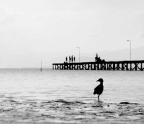Beasts of the Fields
 Thomas Mann Baynes, Running Rats. Fantascope manufactured in London, Great Britain, in 1833.
Thomas Mann Baynes, Running Rats. Fantascope manufactured in London, Great Britain, in 1833. Spring
The rats appeared in late spring, when winter had yet to shake itself loose from our northern New York valley and everything smelled of rain and mud. They came in from the fields and took hold of our barn, which once sheltered the pigs we raised for slaughter. By the time the rats came, though, the barn’s only inhabitants were a dog, an aging cat who slept his afternoons away in faint patches of sunlight, and some mice.
Before that spring, we were used to the skittering of mice in the walls. As we wrestled rototillers and wheelbarrows from the depths of the barn, readying them for their time in the fields, we’d listen for the small scramble of claws against wood, cardboard, and metal scrap.
Long before the rats, I would try to save the baby mice that fell from the rafters, their bodies hitting the cement with a sound like splattering rain. When I found them, I’d wrap them in rough-cut pieces of blue gingham flannel and make them beds from cardboard matchboxes. The babies would last for a day, maybe a bit longer if they were unfortunate, as I tried to feed them droplets of milk with a straw. Someone had to do it, I thought: care for the living creatures who didn’t know they were dead yet.
I would have done the same for the rats, those large-bodied beings with their scaled tales that birthed their babies in the walls and steadied themselves among the rafters. But these rats didn’t need anyone to save them.
In Tanzania, giant pouched rats have been trained to detect the smell of explosives in landmines. They’re shipped to countries where war has left its mark deep in the earth. The rats are fitted with harnesses, their ears slicked with sunscreen to protect them while they work: covering ground, nimbly
You’re reading a preview, subscribe to read more.
Start your free 30 days





